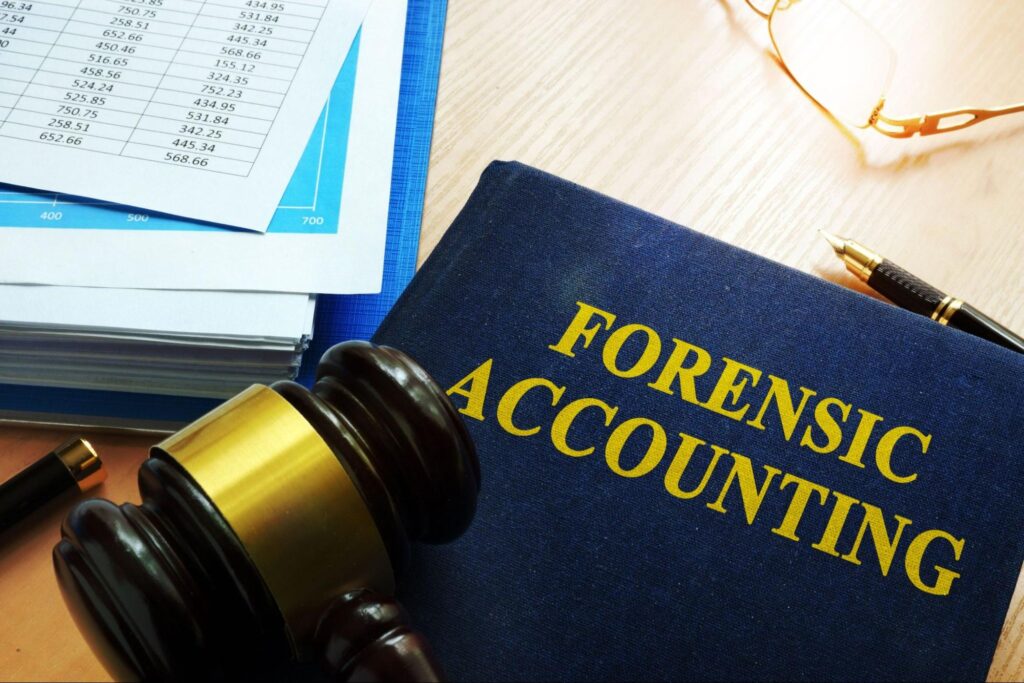Forensic Accounting and Fraud Detection
Forensic accounting is like the Sherlock Holmes of the financial world. It’s all about solving financial mysteries, uncovering hidden truths, and providing expert witness testimony when necessary.
The growing financial crimes and frauds in organizations has increased the demand for certified finance professionals with the added knowledge of investigative techniques will be able to determine whether an activity is illegal or not. This course aims to develop such investigative skills that are required to expose business frauds, measure subsequent damage, and provide litigation support within the accounting and auditing framework.
Forensic accounting is the action of identifying, recording, settling, extracting, sorting,reporting, and verifying past financial data or other accounting activities for settling current or prospective legal disputes or using such past financial data for projecting future financial data to settle legal disputes

Fraud Detection: Unmasking the Culprits
Common Types of Financial Fraud
Embezzlement: When someone misappropriates funds entrusted to them, it’s embezzlement. Forensic accountants track down missing money and build a case against the perpetrators.
Financial Statement Fraud: This involves manipulating financial statements to make a company look more profitable than it is. Forensic accountants scrutinize the numbers to detect any inconsistencies.
Insurance Fraud: Individuals or businesses may exaggerate insurance claims for financial gain. Forensic accountants examine the evidence to determine if a claim is legitimate.
Money Laundering: Criminals often use complex financial transactions to “clean” their ill-gotten gains. Forensic accountants trace these transactions to reveal the source of the funds.
Bribery and Corruption: Suspicious payments, kickbacks, or bribes leave a trail. Forensic accountants follow that trail to identify those involved.
The Forensic Accounting and Fraud Detection Process
dentification: The first step is recognizing that something doesn’t add up. Whether it’s a discrepancy in financial records or unusual transactions, this is where the investigation begins.
Investigation: Forensic accountants dive deep into the financial data, meticulously examining records, transactions, and accounts. They use various tools and techniques to gather evidence.
Evidence Gathering: This is the heart of the operation. Forensic accountants collect and preserve evidence that can stand up in court. This often involves data analysis, interviews, and document examination.
Analysis: The gathered evidence is analyzed to establish the facts and uncover any irregularities or fraudulent activities. It’s like putting together a financial puzzle.
Reporting: Forensic accountants prepare detailed reports summarizing their findings. These reports are often used in legal proceedings or to inform management.
FAQs (Frequently Asked Questions)
Q1: When should a business consider hiring a forensic accountant?
A1: It’s wise to bring in a forensic accountant if you suspect financial misconduct, embezzlement, fraud, or irregularities in your financial
Q2: Can forensic accountants testify in court?
A2: Yes, forensic accountants often serve as expert witnesses in legal cases, providing expert testimony based on their findings.
Q3: How long does a typical forensic accounting investigation take?
A3: The duration varies depending on the complexity of the case. Some investigations may take weeks, while others can stretch into months
Q4: What qualifications do forensic accountants possess?
A4: Forensic accountants typically have a background in accounting and may hold certifications such as Certified Fraud Examiner (CFE) or Certified Public Accountant (CPA).
Practice area's of B K Goyal & Co LLP
Income Tax Return Filing | Income Tax Appeal | Income Tax Notice | GST Registration | GST Return Filing | FSSAI Registration | Company Registration | Company Audit | Company Annual Compliance | Income Tax Audit | Nidhi Company Registration| LLP Registration | Accounting in India | NGO Registration | NGO Audit | ESG | BRSR | Private Security Agency | Udyam Registration | Trademark Registration | Copyright Registration | Patent Registration | Import Export Code | Forensic Accounting and Fraud Detection | Section 8 Company | Foreign Company | 80G and 12A Certificate | FCRA Registration |DGGI Cases | Scrutiny Cases | Income Escapement Cases | Search & Seizure | CIT Appeal | ITAT Appeal | Auditors | Internal Audit | Financial Audit | Process Audit | IEC Code | CA Certification | Income Tax Penalty Notice u/s 271(1)(c) | Income Tax Notice u/s 142(1) | Income Tax Notice u/s 144 |Income Tax Notice u/s 148 | Income Tax Demand Notice